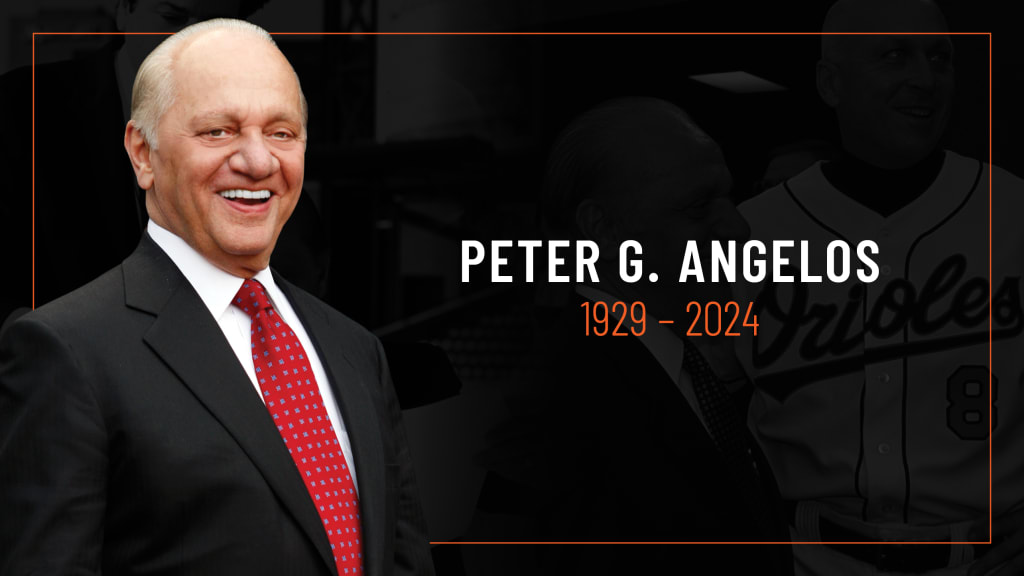
Peter Angelos, who rose from working class roots in Baltimore’s Highlandtown neighborhood to become owner of the Orioles, passed away on Saturday. He was 94.
Angelos was the principal investor in a group that purchased the Orioles in October 1993 for what was, at the time, the highest price that had ever been paid for a sports franchise. Though his public role had diminished in recent years as he dealt with health issues, Angelos remained the American League East franchise’s principal owner until Jan. 31, 2024, when the Angelos family agreed to sell the team to a group led by David Rubenstein.
MLB Commissioner Rob Manfred issued the following statement:
"Peter Angelos was a proud native of Baltimore who deeply appreciated owning the Baltimore Orioles. Peter's lifetime of philanthropy greatly benefited numerous worthy causes throughout his hometown. He championed the Orioles' historic 1999 series with the Cuban National Team. Peter ably served the game on our Labor Committee, and I will always remember his personal support when I was first elected to this role in his home city in 2014. On behalf of Major League Baseball, I send my condolences to Peter’s wife, Georgia, their sons John and Louis, and the entire Angelos family."
The son of Greek immigrants Frances and John Angelos, Peter G. Angelos was born on July 4, 1929. After graduating from the University of Baltimore, he paid his own way through the university’s law school, where he was named the valedictorian. Angelos built a successful law firm that specialized in workers’ compensation matters and fought the asbestos industry. He also served as a Baltimore city councilman and, at one time, was a mayoral candidate.
In 1992, Angelos successfully argued a case in which six companies were found negligent in the nation’s largest consolidation of asbestos personal injury claims.
“The jury by its verdict has served notice on all manufacturers that American working men and women have a right to know of the hazards that confront them in the workplace,” Angelos told the Associated Press at the time. “Those that fail to do so will be held accountable.”
Angelos put some of his personal profit from the damages recovered in that case to work the following year. He headed up an investment group that also included businessman William DeWitt Jr. (eventual owner of the Cardinals) and a host of Baltimore celebrities that included author Tom Clancy, filmmaker Barry Levinson, sports broadcaster Jim McKay and tennis player Pam Shriver to purchase the Orioles at auction from then-owner Eli Jacobs, who put the team up for sale as part of a Chapter 11 bankruptcy process. The total price was $173 million, after the Angelos-DeWitt group outbid Jeffrey Loria in a spirited exchange in a cramped New York bankruptcy court.
When it had appeared DeWitt, from Cincinnati, had been closing in on an agreement to buy the O’s, Angelos had swooped in by cold-calling creditors to tell them he would pay more for the team. Eventually, the two joined forces, allowing Angelos to fulfill his mission of ensuring what was, at the time, Baltimore’s only remaining pro sports team came under the stewardship of a native son.
“We didn’t come here to let this thing be purchased by some out-of-towner,” Angelos told Sports Illustrated.
Angelos bought the team in the midst of the most bitter labor dispute in MLB history, leading to the players’ strike that began in August 1994 and prompted the cancelation of the remainder of the season. When a vote was held among the owners the following year to use replacement players, the only votes against came from the Toronto Blue Jays (because provincial law in Ontario, Canada, disallowed replacement workers replacing union workers who were legally on strike) and Angelos’ Orioles. Angelos further fought the issue by petitioning the Maryland legislature to pass a bill in March 1995 outlawing the use of replacement players in a publicly funded venue, which Camden Yards was.
Ultimately, MLB did not use the scabs, and the labor dispute was resolved the following month.
“The labor movement is responsible for everything good in America,” Angelos told the Baltimore Sun.
Under Angelos, the Orioles reached the American League Championship Series in back-to-back years in 1996-97 and again in 2014. Angelos’ actions surrounding the creation of the Mid-Atlantic Sports Network helped ensure the financial viability of the Orioles when the Expos relocated to Washington, D.C., as the Nationals. But a World Series title proved elusive, and the Orioles significantly scaled back their spending in Angelos’ final years at the helm. With Angelos in failing health, one son, John, became control person for the Orioles in 2020, with another son, Louis, managing his law firm, Peter Angelos Law.
In 1986, Angelos received the Ellis Island Medal of Honor, which “celebrates inspiring Americans who are selflessly working for the betterment of our country and its citizens,” according to the Ellis Island Honors Society, which awards the medals. Inducted into the Baltimore Sun’s Business and Civic Hall of Fame in 2016, Angelos poured millions into the University of Baltimore (where the law school building he made possible bears his parents’ names), the Baltimore Symphony Orchestra, the Greek Orthodox Cathedral of the Annunciation and other civic causes.
